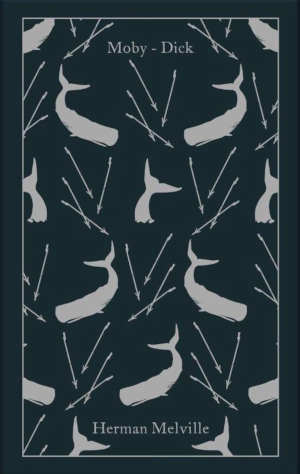Moby-Dick
or, The Whale
- Auteur: Herman Melville (Verenigde Staten)
- Soort boek: Amerikaanse roman uit 1851
- Taal: Engels
- Uitgever: Penguin
- Omvang: 720 pagina’s
- Uitgave: gebonden boek / paperback / ebook
- Nederlandse vertaling: Moby-Dick
- Waardering redactie: ∗∗∗∗∗ (uitmuntend)
- Boek bestellen bij: Amazon / Bol / Libris
Herman Melville Moby-Dick recensie, review en informatie
- “After reading Moby-Dick, you will have enhanced your sense of wonder, you will have increased the size of your universe.” (E. M. Forster)
- “One of the strangest and most wonderful books in the world … It moves awe in the soul.” (D. H. Lawrence)
Flaptekst van de roman uit 1851 van Herman Melville
‘Call me Ishmael.’
So begins Herman Melville’s masterpiece, one of the greatest works of imagination in literary history. As Ishmael is drawn into Captain Ahab’s obsessive quest to slay the white whale Moby-Dick, he finds himself engaged in a metaphysical struggle between good and evil. More than just a novel of adventure, more than an paean to whaling lore and legend, Moby-Dick is a haunting social commentary, populated by some of the most enduring characters in literature; the crew of the Pequod, from stern, Quaker First Mate Starbuck, to the tattooed Polynesian harpooner Queequeg, are a vision of the world in microcosm, the pinnacle of Melville’s lifelong meditation on America.
Written with wonderfully redemptive humour, Moby-Dick is a profound, poetic inquiry into character, faith, and the nature of perception.
Herman Melville (1 augustus 1819, New York City – 28 september 1891, New York City) became in his late twenties a highly successful author of exotic novels based on his experiences as a sailor – writing in quick succession Typee, Omoo, Redburn and White-Jacket. However, his masterpiece Moby-Dick was met with incomprehension and the other later works which are now the basis of his reputation, such as Bartleby, the Scrivener and The Confidence-Man, were failures. Melville stopped writing fiction and the rest of his long life was spent first as a lecturer and then, for nineteen years, as a customs official in New York City. He was also the author of the immensely long poem Clarel, which was similarly dismissed. At the end of his life he wrote Billy Budd, Sailor which was published posthumously in 1924.
